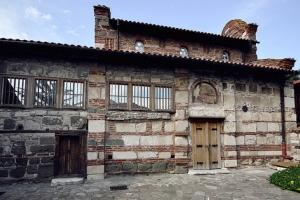Support migrant centric journalism today and donate

 • Watch This Video
• Watch This VideoOfficial figures suggest that there are about 200,000 Romanians working legally in Spain today. But, unofficial estimates suggest that at least 600,000 more Romanians are living and working in Spain illegally. Generally speaking, Spaniards and their government are not only comfortable with this level of immigration from Romania, they are welcoming toward it.
Miguel Fonda, president of Spain's Federation of Romanian Associations (Fedrom), says that "It's been demonstrated that immigrants bring wealth to a country, they don't take it away."
"You can't, on the one hand, say you're in favor of free markets and on the other hand, prevent the free circulation of workers."
Two areas of Spain's economy that are booming are the construction and service sectors which both have a large number of workers from Romania and Bulgaria. This appears to prove Mr Fonda's point that immigration is good for Spain. It is interesting to note that studies in the United Kingdom and Ireland this year consistently show that the economic strength seen in those countries is largely due to a huge influx of East European migrants.
Ireland and the UK had an open-door policy toward the ten countries that joined the European Union to form the EU-25 in May 2004. However, Ireland and Britain have announced a very different policy toward Romanians and Bulgarians when the 30 million citizens of those countries become EU-27 citizens on 01 January 2007. Nationals of these two new EU member States will only be able to work in Britain and Ireland under very limited circumstances. Several other EU States, including Germany and France, have indicated they will continue with their restrictions on workers from the new EU States.
However, a closed-door, or perhaps a 'semi-closed-door,' policy may not be in the best interests of EU States, especially those, such as Germany, that are experiencing serious economic difficulties and a declining birth rate.
Spain is planning to give Romanians and Bulgarians free access to its job market two years after their countries join the European Union, Spanish Foreign Minister Miguel Angel Moratinos announced this week. This will synchronize Spain's labor market transition with the ten States, which joined to form the EU-25 in 2004.
Sweden has indicated they are leaning toward an open-door policy, the same as they implemented in the 2004 EU expansion. Finland and some of the new East European States, namely Poland, have also made statements that they will have few, if any, work restrictions or a transitional period. This summer, Italy lifted most restrictions on workers from the new EU States and appears to be leaning in the same direction for Romania and Bulgaria.
Open-door policies also benefit the home countries where immigrants come from. People from the new EU States tend to remit large portions of their pay back to their home countries. Recent UN analysis shows that this has enormous social benefit in under-developed nations, greatly reducing the reliance on aid to combat poverty.
A Romanian working as a waiter, for example, can easily earn 500 Euros a month which is about four times as much as he or she would earn at home. At a conservative estimate, assuming that 50% of the Romanians working in Spain are earning this sort of salary, this means that 200 million euros are being remitted back to Romania per month, nearly 2.5 billion euros annually from Spain alone.
Far from resenting the money leaving Spain, Spaniards seem to have a somewhat comradely feeling about migrants from Romania and Bulgaria.
"I think Romanians have a very similar culture to ours, a Latin culture,'' says Maria, a psychology student. "I can speak from experience, I have some good friends [who are Romanians]. The positives outweigh the negatives."
Oscar, a salesman, says Romania and Bulgaria have a right to be fully included in Europe.
"Spain had an economic situation very similar to these countries 25 years ago," he says.
"We were also neighbors of Europe, we were part of Europe but outside Europe. And I think they are in the same situation - part of Europe but outside Europe, yet they have a right to be in Europe."
A study commissioned by the Catalan regional government shows that Spain will need four million additional migrants by 2020 to meet the labor demands of its growing economy.
Related:• Visa, work rules change in Bulgaria in preparation for EU-27 expansion
• EU and EEA labor market trends
• Italy opens labour market to new EU members
• Spain and Senegal agree to promote legal migration policy
• UN report - economic role of immigrant women overlooked
• Immigrants help the UK economy grow by 3 percent
• UK plans immigration curbs for new EU States
• UK Tory leader: immigration is good for Britain
• Romania and Bulgaria lobby the UK for open-doors





















